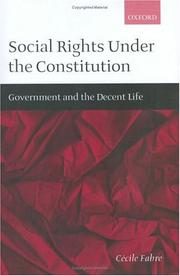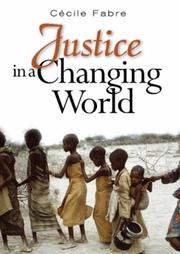| Listing 1 - 10 of 12 | << page >> |
Sort by
|
Book
ISBN: 9780198786245 0198786247 Year: 2016 Publisher: Oxford: Oxford university press,
Abstract | Keywords | Export | Availability | Bookmark
 Loading...
Loading...Choose an application
- Reference Manager
- EndNote
- RefWorks (Direct export to RefWorks)
This book articulates a cosmopolitan theory of the principles which ought to regulate belligerents' conduct in the aftermath of war. Throughout, it relies on the fundamental principle that all human beings, wherever they reside, have rights to the freedoms and resources which they need to lead a flourishing life, and that national and political borders are largely irrelevant to the conferral of those rights. With that principle in hand, the book provides a normative defence of restitutive and reparative justice, the punishment of war criminals, the resort to transitional foreign administration as a means to govern war-torn territories, and the deployment of peacekeeping and occupation forces. It also outlines various reconciliatory and commemorative practices which might facilitate the emergence of trust amongst enemies and thereby improve prospects for peace. The book offers analytical arguments and normative conclusions, with many historical and/or contemporary examples.

ISBN: 9780199532292 9780199289998 0199289999 0191603554 019953229X 9786611154721 0191537314 1281154725 1435624025 9780191537318 Year: 2008 Publisher: Oxford Clarendon Press
Abstract | Keywords | Export | Availability | Bookmark
 Loading...
Loading...Choose an application
- Reference Manager
- EndNote
- RefWorks (Direct export to RefWorks)
In the prevailing liberal ethos, if there is one thing that is beyond the reach of others, it is our body in particular, and our person in general: our legal and political tradition is such that we have the right to deny others access to our person and body, even though doing so would harm those who need personal services from us, or body parts. However, we lack the right to use ourselves as we wish in order to raise income, even though we do not necessarily harm others by doingso---even though we might in fact benefit them by doing so. C--eacute--;cile Fabre's aim in this book is to show that, according to the principles of distributive justice which inform most liberal democracies, both in practice and in theory, it should be exactly the other way around: that is, if it is true that we lack the right to withhold access to material resources from those who need them, we also lack the right to withhold access to our body from those who need it; but we do, under some circumstances, have the right to decide how to use it in orderto raise income. More specifically, she argues in favour of the confiscation of body parts and personal services, as well as of the commercialization of organs, sex, and reproductive capacities.
Status of persons --- Human rights --- Professional ethics. Deontology --- Legal theory and methods. Philosophy of law --- Surrogate mothers --- Gestational mothers --- Host mothers --- Uterine mothers --- Good Samaritan laws --- Assistance in emergencies. --- Personality (Law). --- Assistance in emergencies --- Human body --- Personality (Law) --- Transplantation of organs, tissues, etc --- Medical laws and legislation --- Mothers --- Law and legislation --- Legal status, laws, etc --- Body, Human --- Law and legislation. --- Legal status, laws, etc.

ISBN: 0198296754 9780198296751 Year: 2000 Publisher: Oxford: Clarendon,
Abstract | Keywords | Export | Availability | Bookmark
 Loading...
Loading...Choose an application
- Reference Manager
- EndNote
- RefWorks (Direct export to RefWorks)
Democracy. --- Social justice. --- Equality --- Justice --- Self-government --- Political science --- Representative government and representation --- Republics --- Democracy --- Social justice
Book
ISBN: 1281970867 9786611970864 0191522767 058535264X Year: 2000 Publisher: Oxford : New York : Clarendon Press ; Oxford University Press,
Abstract | Keywords | Export | Availability | Bookmark
 Loading...
Loading...Choose an application
- Reference Manager
- EndNote
- RefWorks (Direct export to RefWorks)
Those in favour of social rights do not usually reflect on the implications of their arguments for democracy and vice versa. This book illustrates the conflict between the demands of democracy and those of social rights.
Democracy. --- Social justice. --- Equality --- Justice --- Self-government --- Political science --- Representative government and representation --- Republics
Book
ISBN: 9780674988866 0674988868 9780674979635 067497963X Year: 2018 Publisher: Cambridge Harvard University Press
Abstract | Keywords | Export | Availability | Bookmark
 Loading...
Loading...Choose an application
- Reference Manager
- EndNote
- RefWorks (Direct export to RefWorks)
Economic sanctions provide an alternative to waging war or a means to advance human rights. But are they morally justifiable? Philosophers have explored the ethics of war but rarely the ethics of carrots and sticks. Cécile Fabre offers a defense of economic statecraft, laying out a normative framework for this critical tool of diplomacy.
E-books --- Economic sanctions --- Economic assistance --- Conditionality (International relations) --- Human rights

ISBN: 9780745639703 Year: 2007 Publisher: Cambridge : Polity press,
Abstract | Keywords | Export | Availability | Bookmark
 Loading...
Loading...Choose an application
- Reference Manager
- EndNote
- RefWorks (Direct export to RefWorks)
Book
ISBN: 0674988841 0674988868 Year: 2018 Publisher: Cambridge, MA : Harvard University Press,
Abstract | Keywords | Export | Availability | Bookmark
 Loading...
Loading...Choose an application
- Reference Manager
- EndNote
- RefWorks (Direct export to RefWorks)
Economic sanctions provide an alternative to waging war or a means to advance human rights. But are they morally justifiable? Philosophers have explored the ethics of war but rarely the ethics of carrots and sticks. Cécile Fabre offers a defense of economic statecraft, laying out a normative framework for this critical tool of diplomacy.
Human rights --- Economic sanctions --- Economic assistance --- Conditionality (International relations) --- Economic aspects. --- Moral and ethical aspects.
Book
ISBN: 2225829535 Year: 1998 Publisher: Paris : Paris : G. Masson, InterEditions,
Abstract | Keywords | Export | Availability | Bookmark
 Loading...
Loading...Choose an application
- Reference Manager
- EndNote
- RefWorks (Direct export to RefWorks)
Book
Year: 1998 Publisher: Paris : InterEditions,
Abstract | Keywords | Export | Availability | Bookmark
 Loading...
Loading...Choose an application
- Reference Manager
- EndNote
- RefWorks (Direct export to RefWorks)
Book
ISBN: 1647691702 Year: 2024 Publisher: Salt Lake City, Utah : The University of Utah Press,
Abstract | Keywords | Export | Availability | Bookmark
 Loading...
Loading...Choose an application
- Reference Manager
- EndNote
- RefWorks (Direct export to RefWorks)
"There is no shortage of criticisms of governments' responses to Covid-19. Surely, we can respond better to the next pandemic. But how? What lessons for the future can we learn from responses to Covid-19? Some elements of adequate preparation for the next pandemic are straightforward and uncontroversial, such as adequate stockpiling of medical supplies, more vigorous efforts to encourage and coordinate vaccine research, improving healthcare infrastructures to function under the stress of a pandemic, developing capacity for vaccine production in less affluent countries, improving early reporting of the emergence of new infectious diseases, and providing more timely, more effective, and better coordinated aid to under-resourced countries. This book identifies institutional failures to explain the substantive flaws of Covid-19 pandemic policies, and then proposes institutional reforms that would reduce the risk that similar institutional failures will occur in the future. Preparation for the next pandemic requires significant institutional change at the national and international levels"--
COVID-19 (Disease) --- COVID-19 Pandemic, 2020-2023. --- Emergency management
| Listing 1 - 10 of 12 | << page >> |
Sort by
|

 Search
Search Feedback
Feedback About UniCat
About UniCat  Help
Help News
News